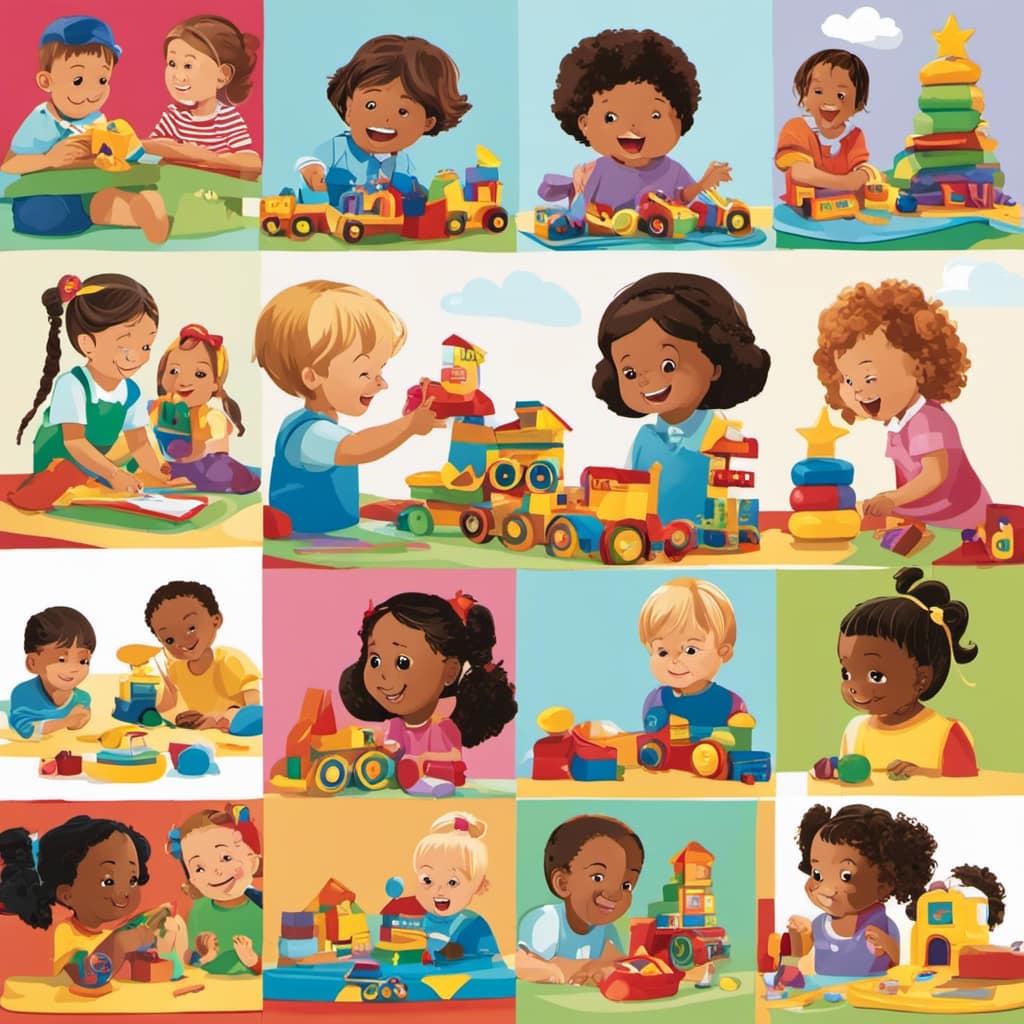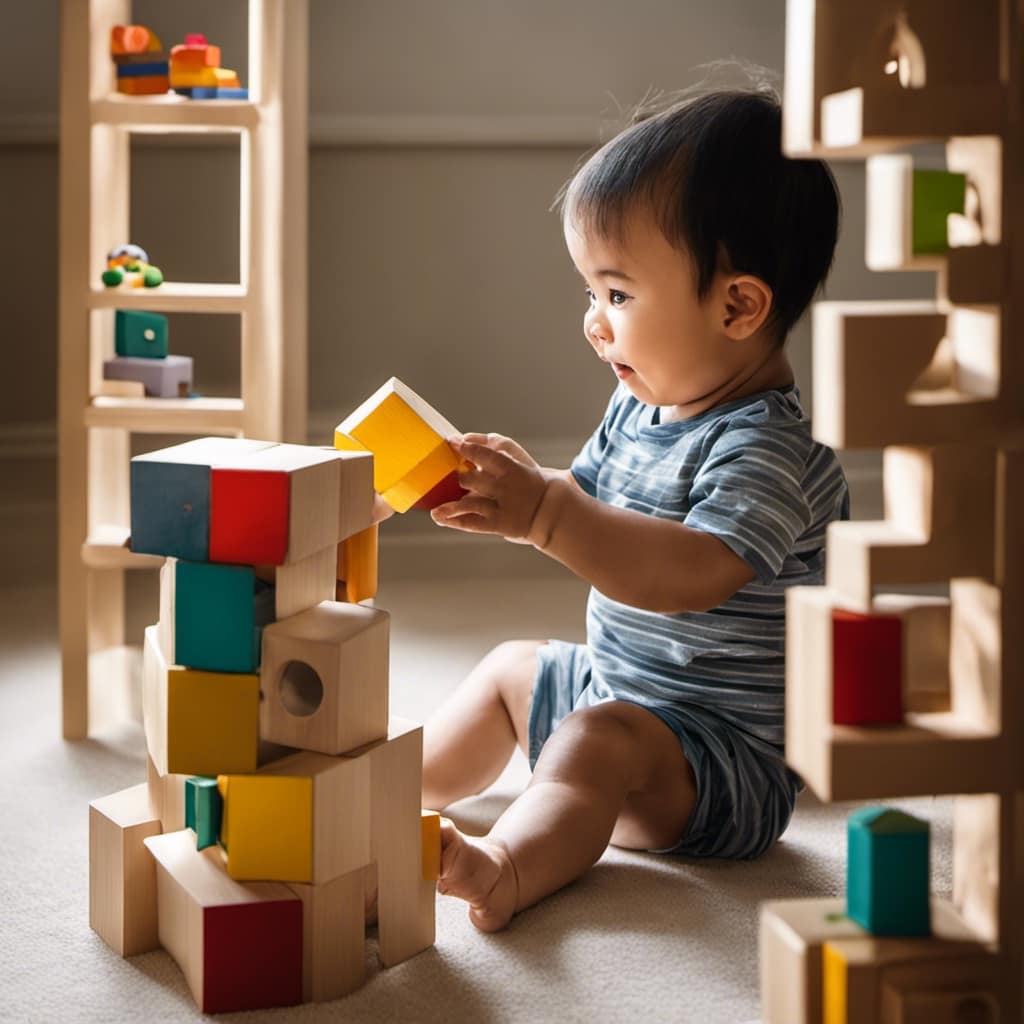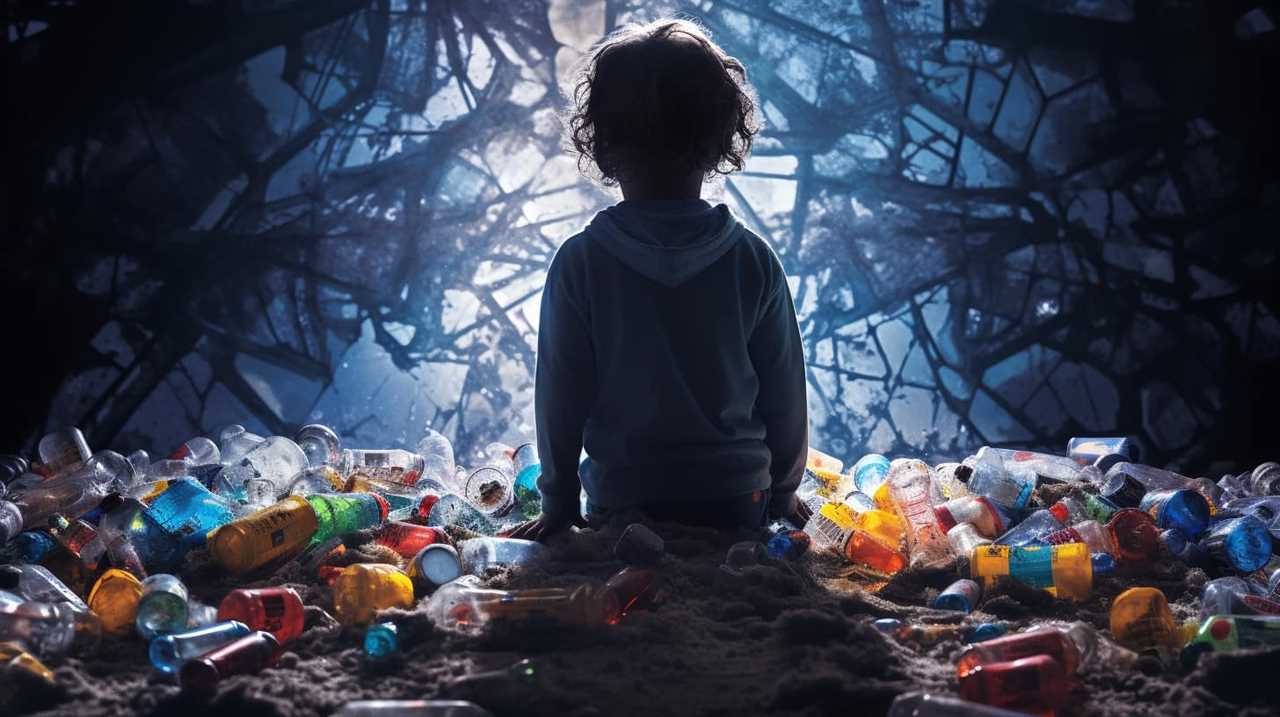As an expert in child development, I have seen firsthand the significant impact that trauma can have on a child’s developing brain. It’s like a storm tearing through their mental landscape, hindering normal growth and leaving lasting scars.
From impaired memory and attention to emotional and behavioral consequences, trauma leaves no aspect of a child’s life untouched.
In this article, we’ll explore the impact of trauma on brain development, behavior, and relationships, and discuss strategies for supporting traumatized children on their path to healing and resilience.
Key Takeaways
- Trauma disrupts normal brain development in children, leading to impaired memory, attention, problem-solving, and executive functions.
- Exposure to trauma in early childhood can disrupt normal brain development, causing impaired memory, attention, problem-solving, and challenges in language and communication skills.
- Trauma can have a negative impact on a child’s brain development, leading to long-term cognitive and academic difficulties.
- Trauma can result in increased levels of anxiety, depression, and PTSD in children.
Impact on Brain Development and Cognitive Functioning
Exposure to trauma in early childhood disrupts brain development, causing impaired memory, attention, and problem-solving skills. This can significantly impact academic performance and lead to long-term cognitive difficulties.
Research shows that traumatic experiences hinder the ability to concentrate and retain information, making it challenging to focus in the classroom and engage in learning activities. These difficulties persist throughout the academic journey and affect overall academic achievement.
Additionally, the effects of trauma on the brain can also lead to challenges in problem-solving and critical thinking skills, which are crucial for academic success.

It is essential for educators and caregivers to recognize the impact of trauma on brain development and provide appropriate support and interventions. These interventions can help mitigate these challenges and promote positive outcomes in the academic journey.
Emotional and Behavioral Consequences
Dealing with the emotional and behavioral aftermath of such experiences can be incredibly challenging. Trauma can have a profound impact on a child’s academic performance and long-term functioning.
Children who have experienced trauma may struggle with focusing, paying attention, and participating effectively in the classroom. These difficulties can hinder their learning and academic achievement. Moreover, the long-term effects of trauma can manifest in cognitive impairments and learning difficulties, which can further impact their educational outcomes.
It is important to recognize and address these challenges to provide appropriate support and interventions for traumatized children. By understanding the impact of trauma on academic performance and long-term effects, we can develop strategies and interventions that foster healing, resilience, and growth, enabling these children to thrive academically and emotionally.
Effects on Social Relationships and Attachment
Navigating the aftermath of such experiences has affected my ability to form secure attachments and maintain healthy social connections. The effects of trauma on social relationships and attachment are profound. Trauma can impact a child’s ability to trust others and feel safe in social settings, leading to difficulties in establishing and maintaining friendships. Peer relationships are crucial for social development, and when trust is compromised, it becomes challenging to form and maintain these connections. Traumatized children may exhibit insecure attachment styles, such as avoidant, anxious, or disorganized attachment. This further hinders their ability to form close emotional bonds and can result in challenges in forming and maintaining friendships. The impact of trauma on peer relationships and social interactions is significant, and it is essential to provide support and interventions that foster healing and growth in these areas.
| Effects on Peer Relationships | Trust and Social Interactions |
|---|---|
| Difficulties in establishing and maintaining friendships | Challenges in forming close emotional bonds |
| Struggles with peer interactions and social skills | Difficulty trusting others |
| Insecure attachment styles (avoidant, anxious, disorganized) | Challenges in forming and maintaining healthy relationships |
Adverse Childhood Experiences and Overall Development
Recognizing the lasting effects of adverse childhood experiences is crucial for professionals working with children. Adverse childhood experiences can have a profound impact on a child’s overall development, affecting both their physical and mental health.

Research shows that children who have experienced adverse childhood experiences are at higher risk for physical health problems such as obesity, heart disease, and even shortened lifespan. Additionally, these experiences can significantly impact a child’s mental health, increasing their likelihood of developing conditions such as anxiety, depression, and post-traumatic stress disorder.
It is important for professionals to be aware of these potential consequences and provide appropriate support and interventions to help children navigate the challenges they may face. By addressing the physical and mental health needs of children who have experienced adverse childhood experiences, we can help them lead healthier and happier lives.
Trauma-Informed Practices for Supporting Children
Implementing trauma-informed practices allows me to create a safe and supportive environment for children who have experienced trauma. In trauma-informed education, it is crucial to have trauma-sensitive classrooms that prioritize the well-being and healing of these children. By understanding the impact of trauma on child development, we can adopt strategies and interventions that support their unique needs. This approach involves personalized approaches, therapeutic interventions like play therapy and cognitive-behavioral therapy, and providing support for processing experiences and developing healthy coping mechanisms. Through a safe and nurturing environment, we can foster healing, growth, and resilience in these children. It is essential to encourage healthy communication, offer emotional support, and engage in activities like art or play therapy for self-expression. By implementing trauma-informed practices, we can create a positive and empowering learning environment for traumatized children.
| Benefits of Trauma-Informed Practices | Emotional Impact |
|---|---|
| Creates a safe and supportive environment | Feelings of safety and trust |
| Helps children feel understood and validated | Sense of belonging and acceptance |
| Promotes emotional regulation and self-control | Improved emotional well-being |
| Enhances social and emotional development | Increased self-esteem and confidence |
| Supports academic success | Reduced anxiety and stress |
| Fosters resilience and healing | Improved overall mental health |
Note: This table aims to evoke an emotional response by highlighting the positive emotional impact of trauma-informed practices. It emphasizes the importance of creating a safe and supportive environment for traumatized children, fostering their emotional well-being, and promoting healing and resilience.
Therapeutic Interventions for Traumatized Children
Experiencing trauma can significantly affect a child’s well-being and may require therapeutic interventions to support their healing and recovery. When it comes to helping traumatized children, two effective therapeutic interventions to consider are play therapy and cognitive-behavioral therapy techniques.
Play therapy effectiveness:

- Play therapy provides a safe and supportive environment for children to express their emotions and process their traumatic experiences through play.
- Through play, children can symbolically reenact their experiences, gain a sense of control, and develop healthier coping strategies.
- Play therapy allows therapists to observe and assess a child’s behavior and emotions, providing valuable insights into their trauma-related struggles.
Cognitive-behavioral therapy techniques:
- Cognitive-behavioral therapy helps children recognize and challenge negative thoughts and beliefs related to their trauma.
- It teaches them coping skills to manage anxiety and regulate their emotions in response to trauma triggers.
- By addressing distorted thinking patterns and providing practical strategies, cognitive-behavioral therapy empowers children to navigate their trauma-related challenges.
Both play therapy and cognitive-behavioral therapy techniques offer valuable tools for supporting traumatized children on their journey towards healing and recovery.
Personalized Approaches to Support Trauma Recovery
I can tailor my approach to support individuals in their trauma recovery journey. Trauma informed care is essential when working with traumatized children.
One effective therapeutic intervention that I utilize is play therapy. Play therapy allows children to express themselves in a safe and non-threatening environment, promoting healing and growth. By engaging in activities such as art or play therapy, children can engage in self-expression and process their traumatic experiences.
I believe in personalizing my approach to meet the unique needs of each child. This involves providing support for processing experiences and developing healthy coping mechanisms. Through trauma informed care and play therapy, I can offer emotional support and help children develop resilience.
It is crucial to create a safe and nurturing environment where children can build coping skills and foster healing.

Promoting Resilience in Traumatized Children
After discussing personalized approaches to support trauma recovery, let’s now shift our focus to promoting resilience in traumatized children.
Promoting resilience through therapy is crucial in helping children overcome the negative effects of trauma and build a strong foundation for their future well-being.
One effective therapeutic intervention is play therapy, which allows children to express their emotions, develop coping skills, and regain a sense of control in a safe and nurturing environment. Through play therapy, children can explore their traumatic experiences, process their feelings, and learn healthy ways to cope with adversity.
Building coping skills through play therapy empowers children to develop resilience, adapt to challenges, and thrive despite their past traumas.
Creating Safe and Nurturing Environments
Creating safe and nurturing environments is essential for promoting resilience in traumatized children.
As a caregiver, I understand the importance of providing a supportive and loving atmosphere that helps children heal and thrive.

Implementing trauma-informed care and practices is crucial in creating these environments. By understanding the impact of trauma on child development, we can tailor our approach to meet the unique needs of each child.
We can provide emotional support, encourage healthy communication, and engage in therapeutic activities like art or play therapy for self-expression.
By implementing trauma-informed practices, we can create a safe space where children feel understood, supported, and empowered.
As caregivers, we have the power to foster healing and growth, and to help traumatized children develop the resilience they need to overcome their past experiences.
Encouraging Healthy Communication and Coping Skills
Engaging in open and honest communication helps children develop healthy coping skills. When children are able to express their thoughts and emotions freely, they learn how to navigate challenging situations and build resilience. Here are two key ways effective communication supports the development of coping skills:
- Building Emotional Awareness:
- By encouraging children to communicate their feelings, they develop a better understanding of their emotions and can identify healthy ways to cope with them.
- Validating and acknowledging their emotions helps them feel heard and understood, fostering a sense of emotional well-being.
- Teaching Problem-Solving:
- Effective communication provides children with a platform to discuss problems and brainstorm solutions, promoting critical thinking and problem-solving skills.
- Through communication, children learn to express their needs and collaborate with others, enhancing their ability to navigate challenges in a constructive manner.
Frequently Asked Questions
How Does Trauma Affect the Physical Development of a Child’s Brain?
Trauma impacts a child’s brain development, causing neurological changes and affecting brain plasticity. These changes can lead to long-term consequences, such as impaired cognitive function and difficulties in emotional regulation and social relationships.

Can Trauma Experienced in Early Childhood Be Reversed or Mitigated Through Intervention?
Early intervention and trauma-informed care can mitigate the impact of trauma experienced in early childhood. By providing personalized support, therapy, and creating safe environments, we can help children heal, develop resilience, and foster healthy development.
What Are Some Long-Term Consequences of Childhood Trauma on Cognitive Functioning?
Childhood trauma can have long-term consequences on cognitive functioning. It can lead to impaired memory and decreased executive functioning. These effects can impact a child’s academic performance and overall learning abilities.
How Does Trauma Impact the Formation of Secure Attachments in Children?
Trauma can hinder the formation of secure attachments in children, impacting their ability to trust and feel safe in relationships. It can also disrupt emotional regulation, making it challenging to develop healthy social skills.
What Are Some Effective Strategies for Helping Traumatized Children Develop Resilience?
Some effective strategies for helping traumatized children develop resilience include providing trauma-informed care, creating safe environments, utilizing therapeutic interventions like play therapy and cognitive-behavioral therapy, and offering support for processing experiences and developing healthy coping mechanisms.
Conclusion
In conclusion, the impact of trauma on child development is significant and far-reaching. Childhood trauma disrupts the normal development of the brain, leading to cognitive difficulties and emotional and behavioral consequences.
It also affects social relationships and attachment, making it difficult for traumatized children to form healthy connections with others. Adverse childhood experiences can have long-lasting effects on a child’s overall development.

However, by implementing trauma-informed practices, providing personalized approaches to support trauma recovery, and promoting resilience, we can help these children heal and thrive.
Remember, every cloud has a silver lining, and with the right support, traumatized children can overcome their challenges and find hope and happiness.










